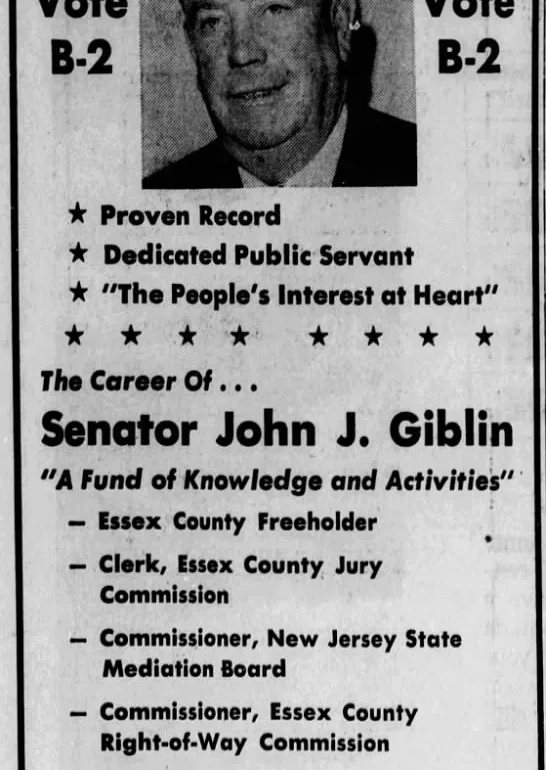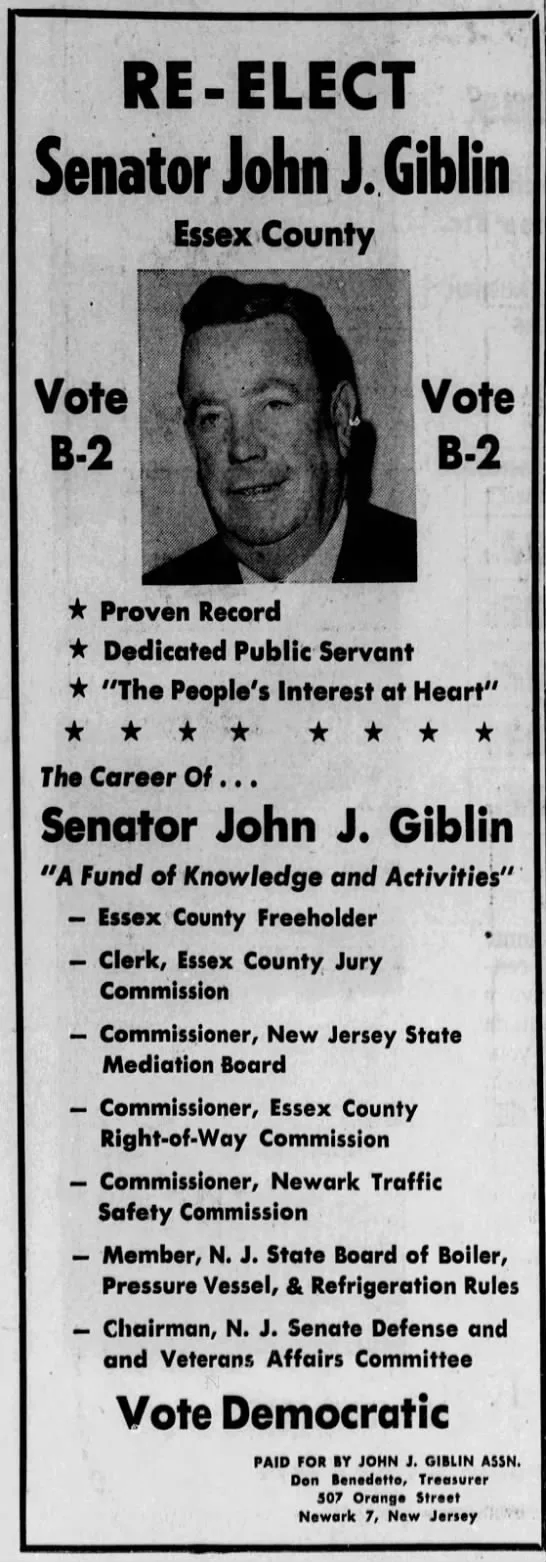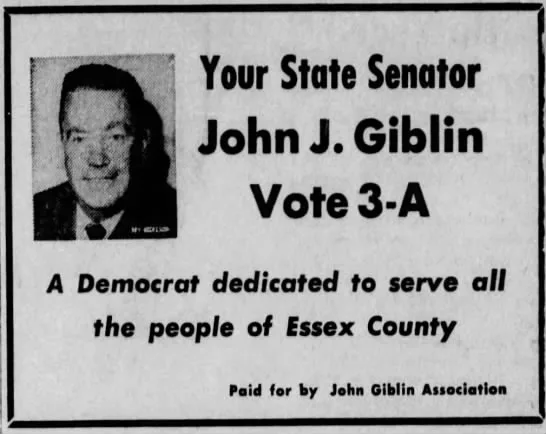John J. Giblin (1909-1975) was one of New Jersey’s most powerful labor leaders, serving as president of the International Union of Operating Engineers Local 68, chairman of the national union, Essex County Freeholder and State Senator.
Giblin was the patriarch of a popular New Jersey political dynasty that is now in its third generation.
Born in Ireland, Giblin joined the Local 68 (AFL) in 1942 when he took a job with the Newark Board of Education.
He was elected to the Newark Charter Study Commission in 1953 that recommended a change in the city’s form of government from five commissioners each running a single city department to a directly elected mayor and nine City Council members.
Giblin ran on a slate backed by the Newark Citizens Committee that included: attorney Alan Lowenstein, the founder of the Lowenstein Sandler law firm; Seton Hall University Law Professor Raymond Del Tufo, who would go on to serve as U.S. Attorney for New Jersey; James Callaghan of the International Union of Electrical, Radio and Machine Workers (CIO); and former Newark League of Women Voters President Ruth Lynn.
Citing the “evils of ward politics,” Giblin declined to support the final recommendations of the commission because he opposed the election of ward councilmembers. Newark had eliminated ward seats in 1918.
Giblin still supported the referendum to change Newark’s form of government, which was approved by voters in November 1953 with the support of another Newark labor leader, Mayor Leo Carlin.
In 1954, Giblin became the Democratic candidate for Essex County Freeholder. At the time, Republicans had 9-0 majority and Democrats had gone 22 years without winning a freeholder race.
He ran on a ticket with Nutley Democratic Municipal Chairman Bernard Rabinowitz and attorney Ferdinand Biunno. They defeated the three Republicans: incumbent Charles Holton, a former Mayor of Essex Fells; Assemblyman Nicholas Joya, a former East Orange City Councilman; and Edith Reinhard, longtime Assemblywoman from Maplewood.
The 1954 freeholder race also featured a special election for an unexpired term for the seat of Jacob Glickenhaus, wo resigned to become a judge. Republicans had appointed former Assemblyman James Curtis (R-Newark), who became the first African American to serve on the Essex County Board of Freeholders.
Curtis was defeated by Rev. Raphus B. Means, the pastor of the Abyssinian Church of Newark. Two years later, Curtis returned for a rematch and ousted Means.
Democrat Weldon Sheets, the East Orange Assistant Postmaster, was elected Essex County Supervisor that year, defeating three-term incumbent Walter Gray. The now-eliminated post had veto power over the Board of Freeholders, giving Democrats an ability to veto any move by the 5-4 Republican majority.
In a race for Essex County Surrogate that year, Democrat Adrian Foley unseated incumbent Samuel Saiber. The two would later head powerful Essex-based law firms: Connell Foley, and Saiber LLC.
Giblin did not seek re-election to a second term as freeholder in 1957. Rabinowitz also declined a second term and Biunno was dropped from the Essex Democratic ticket; he later resurfaced as Newark Business Administrator under Mayor Hugh Addonizio.
Democrats James McKenna, Albert Saldutti and Jeanne Moss held the seats for the Democrats.
Following the U.S. Supreme Court One-Man, One-Vote decision, New Jersey was forced end the practice of one State Senate seat per county.
The Senate expanded its size from 21 to 29 and created an odd map. Some counties were combined into a single Senate district – and others received increased representation in the upper house.
Essex County went from one Senate seat to four.
Giblin became a candidate for State Senator, along with Essex County Counsel Nicholas Fernicola, West Orange Democratic Municipal Chairman Maclyn Goldman, and Newark physician Hutchins F. Inge.
Inge was a last minute addition to the Democratic ticket. Essex County Democratic Chairman Dennis Carey wanted an African American to balance a ticket that included Irish, Italian and Jewish candidates. His first choice was Eulis “Honey” Ward, the Central Ward Democratic Chairman. Ward appeared in a photograph of the ticket sent to several newspapers — but some last minute vetting by Democrats made them decide to pick another candidate after the filing deadline.
Republicans ran their incumbent, Senate Minority Leader C. Robert Sarcone (R-Newark) on a ticket with former U.S. Attorney William F. Tompkins, Assemblyman Irwin Kimmelman (R-South Orange), and Newark funnel director James E. Churchman.
Essex Republicans believed they had scored a candidate recruitment coup when they got William Tompkins to run for Senate. Tompkins had been elected to the Assembly in 1948 and was President Dwight Eisenhower’s pick for U.S. Attorney in 1953. He had founded one of New Jersey’s top law firms, Tompkins, McGuire, Wachenfeld & Barry. Both parties thought Tompkins would coast into the Senate.
Inge and Churchman became the first black candidates to be nominated by a major political party for the New Jersey Senate.
1965 turned out to be a Democratic year and with Gov. Richard Hughes carrying Essex County by nearly 70,000 votes, Democrats won all four Senate seats.
Giblin finished third, 755 votes behind Goldman and 7,081 votes ahead of Inge. Sarcone lost to Inge by 7,144 votes, with Tompkins finishing last.
As a freshman senator, Giblin became chairman of the Veterans’ Affairs and Defense Committee and was given a seat on the State, County and Municipal Government Committee.
New Jersey legislative districts were in constant flux between 1965 and 1973 amidst court challenges to the map and a special 1966 Constitutional Convention to deal with redistricting issues.
The Senate was expanded from 29 to 40 members in 1967 and Essex County increased from four Senate seats to six – all elected in a countywide at-large election.
Giblin, Fernicola, Goldman and Inge sought re-election to second terms, along with Assemblymen David Mandelbaum (D-Maplewood) and Victor Addonizio (D-Orange), the brother of the mayor of Newark.
Republicans fought a fierce primary battle between two feuding factions.
A reform slate of former Assemblyman James Wallwork (R-Short Hills), former Newark Housing Authority Chairman Alexander Matturrri, former Livingston Mayor David Dowd, former Assemblyman Gerardo Del Tufo (R-Newark), Acting Essex County Superintendent of Weights and Measures Michael Giuliano, and former Newark South Ward Republican Municipal Chairman Milton Waldor advanced through a tough GOP primary.
Just 156 votes separated Waldor from the seventh place finisher, Frederic Remington. Remington later became the Essex County Republican Chairman and a two-term Assemblyman.
In the general election, Republicans swept all six Senate seats in what became a strong GOP year statewide. The Republican tide of Gov. Richard Hughes’ second-term midterm ended Giblin’s Senate career after just two years.
Dowd, the sixth place finisher, came in 23,756 votes ahead of the top Democratic vote-getter, The lost of all six Senate seats contributed to the retirement of longtime Essex County Democratic Chairman Dennis F. Carey, who announced at the party’s holiday party in December that he was stepping down for health reasons. That paved the way for Harry Lerner to become county chairman.
At the same holiday party, Goldman and Assemblyman Paul Policastro (D-Newark) got into a fistfight and had to be separated. The argument was over Fernicola blocking the nominations of Brendan Byrne as President of the New Jersey Board of Public Utilities and Joseph Lordi as Essex County Prosecutor during the lame duck session. Fernicola was angry that Hughes announced his nominations in consultation with Carey and not him.
In 1971, Giblin grew angry with Trenton politicians of both parties for raising taxes and launched an independent Essex Bi-Partisan slate with candidates for Senate, Assembly and freeholder as a coalition between labor Democrats and rebel Republicans.
Giblin led the Senate ticket but won just 2.3% of the countywide vote. Still, Giblin received 21,688 votes in a race where 18,503 votes separated Giuliano and Remington.
Essex had been reduced from six Senate seats to five in reapportionment. Democrats won three of those seats.
Two years later, Giblin had made up with Essex County Democrats and his 26-year-old son, Thomas P. Giblin, became the State Assembly candidate in the new 25th district.
A Republican seat that extended from Millburn through West Essex into Wayne Lincoln Park and Pequannock, the incumbent was Assembly Speaker Thomas Kean.
While Kean won easily, Giblin held Republican Jane Burgio to a narrow 1,079-vote victory for the second Assembly seat.
John Giblin died at the end of 1975 at age 66.
Tom Giblin went on to a storied political career that included service as an Essex County Freeholder, Surrogate, Democratic County Chairman, Democratic State Chairman, and since for the last fourteen years as an Assemblyman from the 34th district. He is the business manager of the International Union of Operating Engineers Local 68.
Another son, Vincent P. Giblin, served as president of the International Union of Operating Engineers Local 67, and as International General President of the union from 2005 to 2012.
Among John Giblin’s grandchildren are Verona Councilman Ted Giblin, former Cranford Mayor Patrick Giblin, and Noreen Giblin, the director of the Governor’s Authorities Unit.





